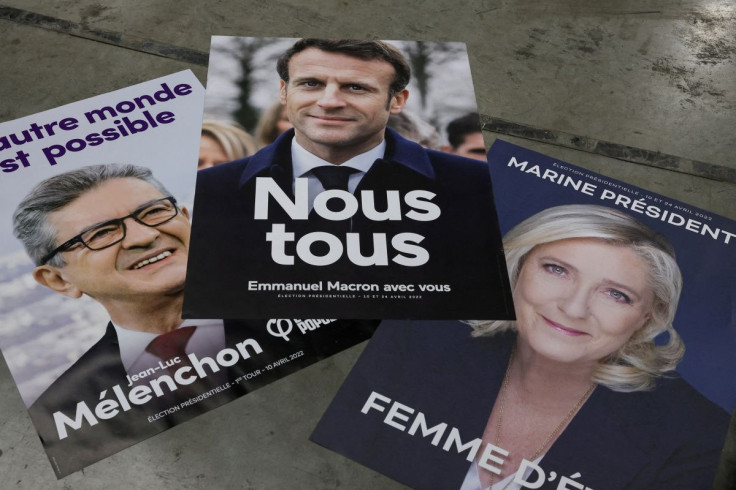Explainer-Macron Or Le Pen: Why It Matters For France, The EU And The West

The French will decide on Sunday whether to re-elect pro-business centrist President Emmanuel Macron or blow up decades of mainstream consensus in favour of far-right Marine Le Pen.
Here's what to expect from them on major issues:
- THE ECONOMY:
LE PEN: The far-right heiress has transformed the former National Front, turning her father's free-market, small-government party into a big-spending, protectionist one.
She wants to implement a "Buy French" policy for public tenders, cut the minimum retirement age to 60 for those who started work before 20, scrap income tax for those aged under 30, and cut VAT on energy to 5.5% from 20%.
She would also spend 2 billion euros ($2.18 billion) over 5 years raising hospital workers' salaries and recruiting an extra 10,000 of them. Teachers' salaries would rise 15% over 5 years.
Gilles Ivaldi, political scientist at Sciences-Po, says her party's economic programme is further to the left than it has been for decades.
"Free trade kills the planet," she said during a TV debate with Macron.
MACRON : The French leader plans to double down on supply-side reforms he has implemented during his first mandate, with the main plank of his manifesto being an increase in the minimum pension age to 65 from 62.
"I don't want to increase our taxes, I don't want to increase our debt, I even want to start paying it off over the next five years," Macron said during the debate. "So I want us to work more."
Macron is also promising to make some welfare benefits conditional on 15-20 hours of training, similar to policies in countries such as the United States or Britain. Unemployment benefits would be linked to the strength of the economy.
In his attempt to stay true to his "neither left nor right" motto, he has also promised to make benefits automatic for those who qualify instead of requiring would-be recipients to apply.
- EUROPE :
LE PEN : She insists she has no "secret agenda" for France - a founding member of the EU - to leave the 27-nation bloc, its single currency or its passport-free Schengen zone.
Opponents believe her policies would at best create new tensions within the bloc - whose unity has been tested in recent years by a migration crisis, Britain's departure and the COVID-19 pandemic - and at worst lead to a "Frexit".
Le Pen has said she would cut French contributions to the EU budget, renegotiate the Schengen agreement and re-introduce checks on goods entering the country from other EU states.
She would seek to re-establish the primacy of French law over EU law - the foundational basis of European integration - and wants the bloc to become a loose association of cooperating sovereign countries.
"It amounts to a complete hollowing-out of what the EU has been trying to achieve all these years," said one senior diplomat. "But it's not presented that way."
MACRON : The ardent Europhile would continue his push to develop what he calls Europe's "strategic autonomy" in defence, technology, agriculture and energy and reduce the bloc's dependence on other powers.
Macron has sought to re-orient the EU towards a more protectionist stance, blocking some free-trade deals with other blocs such as South America's Mercosur and creating a mechanism that increases scrutiny of outside takeovers of strategic EU companies.
Macron is also likely to push for more regulation of U.S. tech giants and has said he wanted to create a "European metaverse" to compete with Facebook's.
The relationship between Paris and Berlin will remain key to shaping Europe's future.
"I believe in the Franco-German couple," he said.
- THE WESTERN ALLIANCE:
LE PEN : Le Pen wants to pull France out of transatlantic military alliance NATO's integrated command, in a challenge to the West's post-Cold War security architecture.
Opponents accuse her of being too close to Moscow. Her party received a bank loan from a Russian bank in 2014 and she was hosted by Russian President Vladimir Putin at the Kremlin shortly before the 2017 presidential election.
Macron accused Le Pen of being on Putin's payroll, telling her: "You talk about your banker when you talk about Russia."
She has condemned Russia's invasion of Ukraine, but says Moscow could be an ally again post-war. She said she would pursue a foreign policy at equal distance from Washington and Moscow.
MACRON : Although Macron ruffled feathers across the trans-Atlantic alliance, notably in eastern Europe and Germany, when he called NATO "brain-dead" in 2019, he has since said the Russian invasion of Ukraine had "jolted it back to life".
He would nonetheless seek to make Europeans less dependent on the U.S. military for security.
Macron has pushed the EU to focus more on the Indo-Pacific and China's rising influence in the region. However, he clashed with Washington, London and Canberra after Australia ditched a massive submarine deal with France.
He has been guarded over whether he would seek to cooperate with the new U.S.-UK-Australia security alliance - dubbed AUKUS - against China or try and persuade the EU to pursue its own independent policy towards Beijing.
($1 = 0.9195 euros)
© Copyright Thomson Reuters 2024. All rights reserved.





















